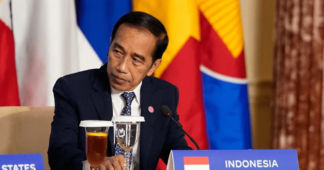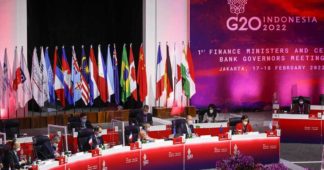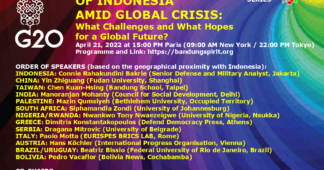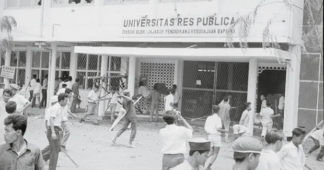Rethinking Indonesia’s non-aligned foreign policy
Author: I Gede Wahyu Wicaksana, Universitas Airlangga
The crisis in Ukraine should prompt Indonesia to reconsider the direction and strategy of its foreign policy. The war is not directly expanding to Indonesia’s immediate geopolitical environment, but it is impacting its strategic situation. China and the United States’ interest and influence in the Russia–Ukraine conflict are also shaping the future of the Indo-Pacific order.
Indonesia’s current foreign policy reflects old Cold War views and objectives, especially that Indonesia should be neutral in ideological bloc contestation because taking sides could jeopardise its sovereignty. But the current great power competition in Asia is not powered by ideology, but by geopolitical and geoeconomic interests. This means it is unlikely that a middle power like Indonesia can effectively pursue outdated non-bloc pragmatism amid the evolving regional security architecture. The Joko ‘Jokowi’ Widodo government must see nonalignment as a means, not an end.
Concerning the ongoing Russia–Ukraine war, Jokowi’s foreign policy shows little geopolitical awareness. For example, Indonesia’s military exercise with the United States in early August 2021 was followed by China and Russia holding a similar largescale activity. Sutiyoso, a retired general and political ally of Jokowi, said it was ‘important to signal that Indonesia was not leaning toward China’, but why did non-aligned Jakarta not take a similar military approach to China and Russia? In part, because Indonesia’s military elites distrust their Chinese counterparts.
Continue reading at www.eastasiaforum.org
How will Indonesia deal with Russia and Ukraine at the G20?
Almost 120 days have passed since Russia invaded Ukraine, and the war continues to have ripple effects across the world. While western countries have been united in their support for Ukraine (to different degrees), many others have appeared reluctant to punish Russia for its actions. Some have even seemed supportive.
In 2022, Indonesia holds the G20 presidency, so its response to the conflict is important. After voting in support of the UN General Assembly resolution condemning the Russian attack on 2 March, Indonesia later abstained from the vote to suspend Russia from the UN Human Rights Council. It has been described as “a fence sitter” with a “tepid” and “wholly inadequate” response.
In the face of pressure from western countries to rescind Russian President Vladimir Putin’s invitation to the G20 leaders’ summit in Bali in November, Indonesia instead made the surprising move in April to also invite Ukrainian President Volodymyr Zelenskyy. In another sign of its ambivalent approach to the conflict, Indonesia made it clear that Putin would still be invited. A few days ago, Russian media even reported that President Joko “Jokowi” Widodo will travel to Russia to meet with Putin on 30 June, in preparation for the G20 summit.
Continue reading at indonesiaatmelbourne.unimelb.edu.au
Also read
It is high time for the Non – Aligned to intervene in the Ukrainian crisis
We remind our readers that publication of articles on our site does not mean that we agree with what is written. Our policy is to publish anything which we consider of interest, so as to assist our readers in forming their opinions. Sometimes we even publish articles with which we totally disagree, since we believe it is important for our readers to be informed on as wide a spectrum of views as possible.











